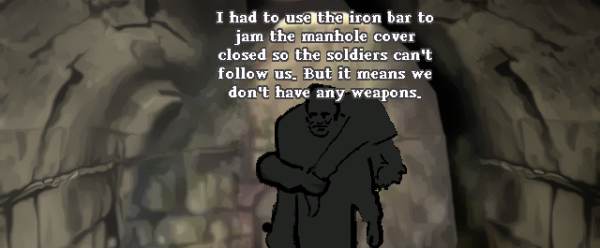French Revolution: Enter the Story: Les Miserables
This caught my eye over on TigSource, for a load of reasons. It's an adventure game (kinda) version of Les Miserables. You buy the game for 15 dollars, and you get the next two games in the series free (Which are based on the Divine Comedy and Roman poet Lucretius' "The Nature of things. Apparently). Even more-so, the profits are being put towards his research into popularising Georgist ideas of Land-rent. Oh - and he's got plans for the next five years. Ideas aren't in short supply.
Clearly, I had to give a demo a shot...
It's interesting. It's all set in the sewer section of the game - which Tigsource, having played more, thinks is a shame - and showcases some of the game's more interesting aspects. For example, you don't actually play anyone embedded in the actual narrative, but some manner of floating entity trying to guide the story. You double-left click on any individual to get them to say what they're thinking right now. You right click on each of them and then on something around them to draw their attention to it. When you're not doing that, you're able to float around the map freely. You can't interact, but you can scout. For example, the first obvious puzzle in the game - which I didn't get past - is to get past two guards in the junction. You're able to prompt them into responding, but they're not interested in investigating stuff. Conversely, the main character will make his way to most places, and happily spends a lot of time poking at the shit with a handy stick and soliloquizing.
You may guess that I've never read Les Miserables, at least partially out of a belief that if it can be turned into a musical, it probably isn't worth bothering with. Conversely, I've always been a big believer if something can be turned into a videogame, it's worth bothering with - few know that Super Mario Brothers was originally based on the Brothers Karamazov. As such, this actually seems novely-atompsheric. The graphics are, abstractly, terrible - but they're also terribly abstract, and so manage to turn their limitation into an absolute merit. It brings to mind a few rotoscoped games, but really looks like few things else. That it managed to prove quite compelling even despite being as serious as the book it's based on. The whole project has got a confidence about it.
I didn't persist out of time and a sense that this is really John Walker territory which I'm infringing, but I suspect that some of you will be very interested in this oblique graphic adventure. You can get the demo here.


